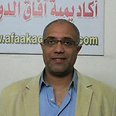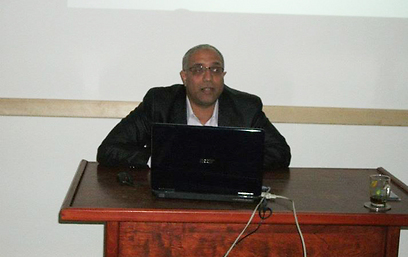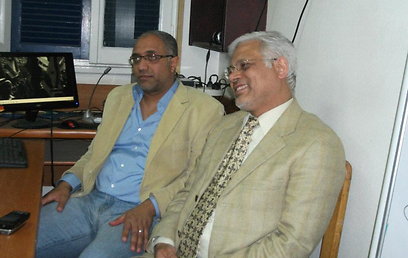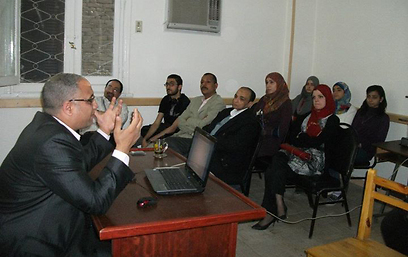
Egyptian Hebrew speakers take Israeli public by storm
Cairo's revolt reveals Egyptian commentators with surprisingly fluent Hebrew in Israeli media. One commentator is Hebrew scholar Amr Zakaria who nearly collapsed from interviews: 'I just turned off my phone'
Almost 25 years have passed, and this academic procedure is responsible for having Zakaria starring in the past few weeks as a wanted and remarkably eloquent interviewee in the Israeli media.
Related stories:
- Egyptians want peace, says blogger visiting Israel
- Egypt: Army preparing operation to 'purify' Sinai of terrorists
- Arab-Israelis: 'We'll give our lives for Morsi'
Many were astonished to hear the polished Hebrew that enlightened them about the revolt in Egypt and the ouster of Mohamed Morsi. "Interviews are tiring," said Zakaria in (yet another) interview to Ynet, and tried to explain how he handled the demand during this period. "I would like for you to call me at better times. At some point I had not slept for two entire days because of the pressure and interviews. One day I just decided to turn off my phone."
Zakaria, 41, a resident of Giza district, is a long-time academic researcher of Israeli studies and a Hebrew translator. According to him, he is not at all unique: Egypt has 12 universities which almost all teach Hebrew, and every year about 1,200 students graduate Hebrew programs, sometimes even more.

Amr Zakaria: 'Some 1,200 students a year graduate Hebrew programs'
"Hebrew has been taught in Egypt since the '50s," he explained. "When I started studying at the University of Cairo in 1989, there were about 100 graduates in my class. I was the top student, and together with a fellow student, who works today for the Egyptian radio, we are the only ones from our class who stayed in the field of Hebrew."
Your Hebrew, as well as others', surprised many here in recent weeks.
"Listen, Hebrew is very similar to Arabic. The sentence construction and conjugation are not difficult. I can honestly tell you: Hebrew is easier than Arabic. I already know Hebrew better than Arabic. In Arabic, for example, I still need proofreading."
What Hebrew materials do you use?
"Mostly the media. Papers, television, internet, radio, and sometimes and I also talk to friends on Skype."
What about Israeli music?
"No. Other the other hand, I don't listen to Arabic music either."
'Ofakim' school in Giza
Despite Zakaria's fluency, many students of the Hebrew faculties are still experiencing difficulties. So he took the initiative, and together with some friends, including Israeli affairs journalist Munir Mahmoud, they opened a Hebrew private school. They called the institute "Ofakim."
What do you teach there?
"The students receive articles and a tape with everyday conversations in Hebrew. We teach them the language but also about Israel in general. We try to be objective and not tell students whether to hate or love. They can do whatever they want."

Zakaria (left), tries to be objective

Zakaria teaching about Judaism
What is there to do with Hebrew in Egypt nowadays?
"In the past there were more possibilities. Prior to the January 25 revolt, tourism from Israel was a field you could truly make a living in. Today there are a few positions in the media, academia and some international companies that provide customer service in Hebrew."
How is it received in Egypt?
"It is not something ordinary. You can't open a Hebrew book in public without someone asking you about it. If someone calls me from Israel I can't answer in Hebrew right away. Very quickly I'll be asked what this language is. Once I opened a Hebrew book in a public place and suddenly someone from Gaza approached me and started asking questions. I'd rather avoid these incidents."
No living from Hebrew
Zakaria is in no way a Zionist enthusiast, and he has plenty of criticism towards Israel's policy in Judea and Samaria, but at the same time he runs a Facebook group called "Talking Peace," which has a primary goal of establishing dialogue between Arabs and Israelis.
When you, the Egyptian Hebrew speakers, serve as commentators on Israel, do you present it in a positive light?
"I hope it has a positive effect. Many times I write things about Israel and the comments of my readers are racist. But it's always better to have a common language. Many Egyptians are still surprised that I talk to Israelis, because they have this image that an Israeli is a monster."
You have already translated eight books from Hebrew to Arabic, and even wrote some yourself. It is a way to make a living?
"No, it's a mission. It's not good business because the literacy rate in Egypt is not as high as it is in Israel. People only read in universities. Besides, nobody reads books. I can't make a living from translating but I think there's a need for Egyptians to know what Israelis are saying about us and other issues. I want people to know Israel, its society, Judaism and its politics."
- Receive Ynetnews updates directly to your desktop










